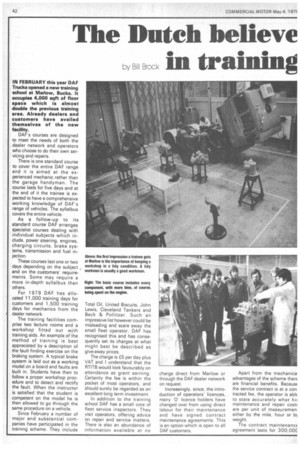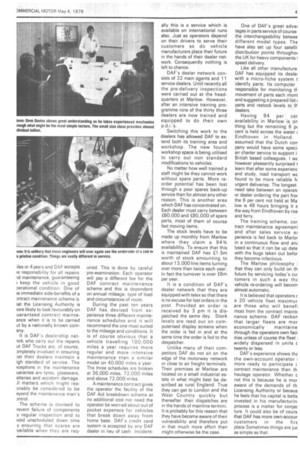The Dutch believe
Page 44

Page 45

If you've noticed an error in this article please click here to report it so we can fix it.
by Bill Brock funk training IN FEBRUARY this year DAF Trucks opened a new training school at Marlow, Bucks. It occupies 4,000 sqft of floor space which is almost double the previous training area. Already dealers and customers have availed themselves of the new facility.
DAF's courses are designed to meet the needs of both the dealer network and operators who choose to do their own servicing and repairs.
There is one standard course to cover the entire DAF range and it is aimed at the experienced mechanic rather than the garage handyman. The course lasts for five days and at the end of it the trainee is expected to have a comprehensive working knowledge of DAF's range of vehicles. The syllalbus covers the entire vehicle.
As a follow-up to its standard course DAF arranges specialist courses dealing with individual subjects which include, power steering, engines, charging circuits, brake systems, transmission and fuel injection.
These courses last one or two days depending on the subject and on the customers' requirements. Some may require a more in-depth syllalbus than others.
For 1979 DAF has allocated 11,000 training days for customers and 1,500 training days for mechanics from the dealer network.
The training facilities comprise two lecture rooms and a workshop fitted out wjth training aids. An example of the method of training is best appreciated by a description of the fault finding exercise on the braking system. A typical brake system is laid out as a working model on a board and faults are built in. Students have then to follow a proper workshop procedure and to detect and rectify the fault. When the instructor is satisfied that the student is competent on the model he is then allowed to go through the same procedure on a vehicle.
Since February a number of major and substantial com panies have participated in the training scheme. They include Total Oil, United Biscuits, John Lewis, Cleveland Tankers and Beck & Pollitzer. Such an impressive list however could be misleading and scare away the small fleet operator. DAF has recognised this and has consequently set its charges at what might best be described as give-away prices.
The charge is £5 per day plus VAT and I understand that the RTITB would look favourably on attendance as grant earning. Certainly the fee is within the pocket of most operators, and should surely be regarded as an excellent long term investment.
In addition to the training school DAF has a small core of fleet service inspectors. They visit operators, offering advice on repair and service matters. There is also an abundance of information available at no charge direct from Marlow or through the DAF dealer network on request.
Increasingly, since, the introduction of operators' licences, many "0' licence holders have changed over from using direct labour for their maintenance and have signed contract maintenance agreements. This is an option which is open to all DAF customers. Apart from the mechanica advantages of the scheme there are financial benefits. Because the service contract is at a con tracted fee, the operator is able to state accurately what hi! maintenance and repair costE are per unit of measurernen either by the mile, hour or b) weight The contract maintenance agreement lasts for 300,00( lies or 4 yea rs and DAF accepts le responsibility for all repairs id maintenance, guaranteeing ) keep the vehicle in good Derational condition. One of ie immediate side-benefits of a Dntract maintenance scheme is tat the Licensing Authority is tore likely to look favourably on uaranteed contract mainteance when it is to be carried ut by a nationally known cornany.
It is DAF's dealership nettork who carry out the repairs ut DAF Trucks are, of course, Dmpletely involved in ensuring tat their dealers maintain a igh standard of service. The Kceptions in the maintenance uarantee are tyres, glassware, atteries and accident damage. .11 matters which might reaDnably be considered to be eyond the maintenance man's Dntrol.
The scheme is devised to revent failure of components y regular inspection and to void unscheduled down time y ensuring that spares are vailable when they are req
uired. This is done by careful pre-examination. Each operator will pay a different fee for the DAF contract maintenance scheme and this is dependent on annual mileage, type of load and circumstances of route.
During the past ten years DAF has devised from experience three different maintenance schedules and it will recommend the one most suited to the mileage and conditions. It is of course obvious that a vehicle travelling 100,000 miles a year requires more regular and more intensive maintenance than a similar model on 40,000 miles a year. The three schedules are broken at 36,000 miles, 72,000 miles and above 72,000 miles.
A maintenance contract gives the operator the facility of the DAF Aid breakdown scheme at no additional cost nor need the operator be worried about out of pocket expenses for vehicles that break down away from home base. DAF's credit card system is accepted by any DAF dealer in lieu of cash. Incident ally this is a service which is available on international runs also. Just as operators depend on their drivers to serve their customers so do vehicle manufacturers place their future in the hands of their dealer network. Consequently nothing is left to chance.
DAF's dealer network consists of 22 main agents and 11 service dealers. Until recently all the pre-delivery inspections were carried out at the headquarters at Marlow. However, after an intensive training programme nine of the thirty three dealers are now trained and equipped to do their own p.d.i.'s.
Switching this work to the dealers has allowed DAF to extend both its training area and workshop. The new found workshop space is being utilised to carry out non standard modifications to vehicles.
No matter how well trained a staff might be they cannot work without spare parts. More reorder potential has been lost through a poor spares back-up service than for almost any other reason. This is another area which DAF has concentrated on.
Each dealer must carry between E60,000 and £80,000 of spare parts, most of them of course fast moving items.
The stock levels have to be made up monthly from Marlow where they claim a 94% availabililty. To ensure that this is maintained DAF has £1.5m worth of stock amounting to about 13,000 line items turning over more than twice each year. In fact the turnover is over £6m per year.
It is a condition of DAF's dealer network that they are equipped with telex so that there is no excuse for lost orders in the post. Provided an order is received by 3 pm it is dispatched the same day. Stock levels are read out on cornputerised display screens when the order is fed in and at the same time the order is fed to the despatcher.
Unlike many of their competitors DAF do not sit on the edge of the motorway network or close to air freight terminals. Their premises at Marlow are located on a small industrial estate in what might best be described as rural England. True they can get to London and the West Country quickly but thereafter their dispatches are in the hands of mainline termini. It is probably for this reason that they have become aware of their vulnerability and therefore put in that much more effort than might otherwise be the case.
One of DAF's great advai tages in parts service of course the interchangeability betwee different model types. ThE have also set up four satellit distribution points throughoi the UK for heavy components1 speed delivery.
Like all other manufacture DAF has equipped its dealei with a micro-fiche system 1 identify parts. Its computer responsible for monitoring movement of parts each mord and suggesting a prepared list parts and restock levels to t1. dealers.
Having 94 per cer availability in Marlow is on thing but the remaining 6 pi cent is held across the water Eindhoven in Holland. assumed that the Dutch con pany would have some specii air charter service to support i• British based colleagues. I wE however pleasantly surprised 1 learn that after some experienc and study, road transport wE found to be more reliable fc urgent deliveries. The longest need take between an operat( or dealer ordering the part fror the 6 per cent not held at Ma low is 48 hours bringing it a the way from Eindhoven by roa and ferry.
The training scheme, cor tract maintenance agreement and after sales service e) perience is fed back to Mario, in a continuous flow and am lysed so that it can be up date with the bugs taken out befor they become infectious.
The Marlow philosophy that they can only build on th future by servicing today's cut tomers in such a way thE vehicle re-ordering will becom almost automatic.
It is believed that operators c a 20 vehicle fleet maximur .are those who will benefi most from the contract maint( nance scheme. DAF reckon that larger fleets are mor economically maintaine through the operators own faci ities unless of course the fleet . widely dispersed in units c twenty or less.
DAF's experience shows thE the own-account operator more ready to participate i contract maintenance than th haulage operator. Whether c not this is because he is mor aware of the demands of th Licensing Authority or becaus he feels that his capital is bette invested in his manufacturin process is a matter for conjec ture. It could also be of cours that DAF has more own-accour customers in the firs place.Sometimes things are jUE as simple as that.
























































































































